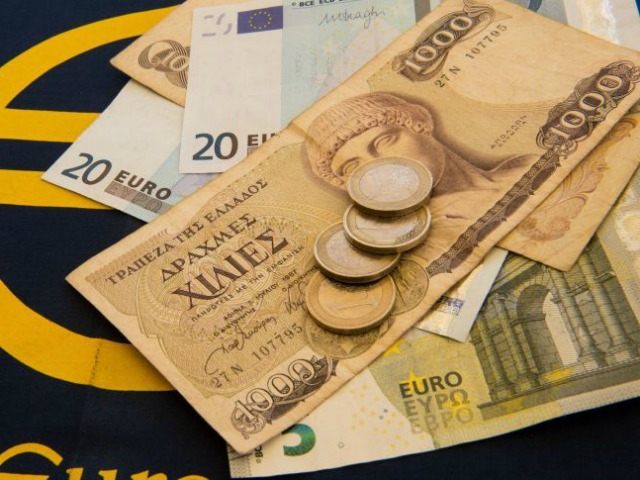A Bloomberg reporter, presumably in Athens to cover the developing Greek debt crisis, received quite a surprise with the bill: a charge in the Greek drachma, a long-defunct currency looming its head as the possibility of Greece leaving the euro behind grows with every day its government fails to make a debt payment to Europe.
As the reporter paid with a credit card, no hard currency was exchanged. Upon using a Visa, however, the bill returned a charge in “Drachma EQ.” Bloomberg attempted to find an answer for this bizarre notation, but the drachma only “flummoxed two very polite customer service representatives and spokesmen for the companies involved,” Hilton and Visa.
The news organization notes that, because multiple parties process the transfer of money in credit card exchanges, it is difficult to find exactly which party to the exchange decided to translate dollars to drachmas instead of euros. “Each time a consumer swipes a card, information passes between four parties: a merchant, the merchant’s bank, a network like Visa or MasterCard Inc. and the consumer’s bank,” Bloomberg explains, noting that Hilton refused to provide the identity of one of those parties, the “acquirer.”
Few have concluded that this rogue abandonment of the euro reflects upon any activity by the Greek government, which has emphasized a desire to avoid a return to the drachma and remain within the Eurozone. Fortune magazine suggests, however, that it is possible the charge indicates that credit card companies are testing out the possibility of using the drachma to be prepared should Greece fail to reach a deal with its creditors and abandon the euro.
The Bloomberg anecdote has made headlines in Greece, where newspapers are calling the incident “strange” and “unexplained.”
Prime Minister Alexis Tsipras has finally submitted a proposal for a new loan deal to Greece’s creditors and is anticipating a parliamentary vote on the new deal on Friday. That deal contains many of the elements the EU and IMF proposed in a previous deal that was the subject of a national referendum, and was widely rejected as Tsipras’s urging. Now, Tsipras must sell a very similar deal back to the people from which he encouraged a “No” vote. The deal includes tax hikes on shipping and significant defense spending cuts.
Eurogroup President Jeroen Dijsselbloem has called the new deal “a thorough piece of text,” and the EU and IMF are expected to accept the deal.
Whether the Greek Parliament, controlled by Tsipras’ Radical Left Party Syriza, will accept the terms is a more open question. In response to Tsipras’ proposal, five Syriza members are proposing abandoning Europe entirely and returning to the drachma as soon as possible. “The government even at this hour can and should respond to the institutions’ blackmail with the dilemma: either a programme without new austerity, with funding and a debt write-off or an exit from the euro and suspension of payments of the unjust and non viable debt,” they wrote in a letter to the party leadership.
